Bali Climate Talks Wrap Up
Air Date: Week of December 14, 2007

Japanese Environment Minister Ichiro Kamoshita cuts the 10th anniversary cake of the Kyoto Protocol. (Courtesy of Earth Negotiations Bulletin (ENB))
The international community struggles to come up with a plan for the next phase of the Kyoto Protocol, and Al Gore asks nations to move forward rapidly to fight climate change, despite the United States’ reluctance to call for mandatory action. Host Steve Curwood reports on the progress and conflicts as the United Nations climate conference wraps up in Bali,including developments regarding a tropical forest protection plan known as REDD- Reducing Emissions from Deforestation and Forest Degradation.
Transcript
CURWOOD: From Nusa Dua, on Bali Island in Indonesia, this is Living on Earth. I’m Steve Curwood reporting from United Nations Climate change conference here.
[DRUMS PLAY AND PEOPLE SINGING]
CURWOOD: Island children greeted delegates from almost every country in the world as hundreds of reporters, scientists and campaigners descended on this South Seas resort island for the first two weeks of December.
Some shouted, some pleaded, some simply quietly negotiated about how the world should move forward after the first so-called commitment period of the Kyoto Protocol expires in 2012. The mission was to develop a plan for how to move forward in the fight again global warming, with 2009 as the target for a final agreement.
While the negotiators were vague about the precise amount of greenhouse gas reductions to be negotiated in the years ahead, there were breakthroughs in terms of developing countries and forests. With me now to explain those and other issues is Alden Meyer of the Union of Concerned Scientists.
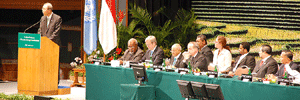
United Nations Secretary-General Ban Ki-moon addressing delegates at the opening of the High-Level segment. (Courtesy of Earth Negotiations Bulletin (ENB))
But they are willing to put significant proposals on the table to slow the growth and eventually cap and reduce their absolute emissions of greenhouse gases over coming decades. And that’s a real political breakthrough. It’s the kind of thing that people in the United States, who have been critical of the Kyoto Protocol, have said it’s not global and it won’t work because China and India and Brazil won’t do anything. Well, they’re willing to do some very significant things in negotiations over the next two years.
CURWOOD: What are the kinds of numbers that the developing countries say they’re willing to take on as part of the whole, that is, as part of the whole world?
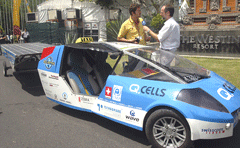
Five months after a pioneering world tour from Switzerland to Bali, a solar powered taxi has arrived at the UN Climate Change Conference.
(Courtesy of Earth Negotiations Bulletin (ENB))

Japanese Environment Minister Ichiro Kamoshita cuts the 10th anniversary cake of the Kyoto Protocol.(Courtesy of Earth Negotiations Bulletin (ENB))
CURWOOD: I understand there was a breakthrough in terms of tropical forests. What happened?
MEYER: Well, what happened is that for the first time countries formally agreed to put on the negotiating table proposals to help developing countries with rainforests—Indonesia or Brazil, Congo, some of the Central American countries, others—help them get the money and technical assistance they need to preserve their rainforests rather than feeling like they have to cut them down.
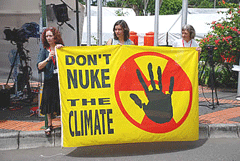
Climate protesters getting their message across.(Courtesy of Earth Negotiations Bulletin (ENB))
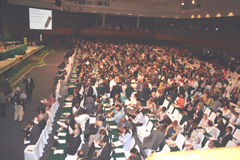
The delegates gather at the UN Climate Change Conference (Photo: Steve Curwood)
MEYER: By the meeting in Copenhagen at the end of 2009, they hope to have wrapped up negotiations on this next phase of the international climate treaty process. Fortunately, that’s about ten months after the next president takes office. There’s been a lot of talk in these halls about how willing he or she may be to engage more constructively in this debate than President Bush has been. And people are putting a lot of stock in the representation of U.S. and environmental and business groups here, that the next president will be more forthcoming and willing to step up to the plate and provide U.S. leadership again in this process.
CURWOOD: How satisfied are you with what happened here in Bali? From your perspective, did the world get enough to go forward?
MEYER: Well, it obviously isn’t a perfect result, but it’s not a disaster. It could well have been a disaster. It could have come crashing down. We could have seen a polarization between North and South that could have set back the process. We didn’t get the outcome that we wanted with clear targets for going forward over the next two years, but we got enough there I think to continue to build political will in the united states, to have the rest of the world going forward without us for the next year, and then to let the next president of the U.S. reengage in early 2009 and hopefully produce a strong, new agreement—negotiated agreement by the Copenhagen meeting by the end of that year.

A billboard announcing the UN conference is a back-drop to the morning commute. (Photo: Steve Curwood)
MEYER: Good to be with you, Steve.
CURWOOD: At a moment when it seemed that negotiations had become hopelessly bogged down here in Bali, former Vice President Al Gore was perhaps the most prominent of the dignitaries who came here to encourage the negotiators. The former vice president came from his Nobel Peace Prize ceremony in Oslo to address the climate change conference. He chastised the Bush administration for being what he called an obstacle and urged the delegates to consider the long term. Here’s an excerpt of his remarks.
GORE: We the human species face a planetary emergency. Just this week new evidence has been presented. I remember years ago listening to the scientists, who specialize in the study of ice and snow, express concern that sometime toward the end of the 21st century we might even face the possibility of losing the entire north polar ice cap. I remember only three years ago, when they revised their estimates to say it could happen halfway through the 21st century, by 2050. I remember at the beginning of this year, when I was shocked, along with others, to hear them say it could happen in as little as 34 years. And now, this week, they tell us it could completely disappear in as little as five to seven years.
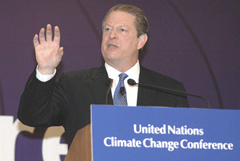
Nobel Peace Prize laureate Al Gore speaks at a side event organized by the Alliance for Climate Protection (Courtesy of Earth Negotiations Bulletin (ENB))
[APPLAUSE]
GORE: Decades ago Martin Luther King Jr. said, ‘injustice anywhere is a threat to justice everywhere.’ In like fashion, global warming pollution increased anywhere threatens the future of world civilization everywhere. That is the basis for rethinking what used to be called ‘foreign aid,’ or assistance. We have an obligation to form partnerships to reduce CO2 everywhere on Earth. So we must leave here with a strong mandate.
The greatest opportunity inherent in this climate crisis is not only to quickly deploy the new technologies that will facilitate sustainable development and create the new jobs and to lift standards of living. The greatest opportunity is that in rising to meet the climate crisis, we in our generation will find the moral authority and capacity for long-term vision to get our act together in this world. We are one people, on one planet. We have one future, one destiny. We must pursue it together and we can.
When we hear of that phrase ‘capacity building,’ it’s usually used by someone in a wealthy country talking about poor countries. I think it’s time we had capacity building in the wealthy, developed countries. For leadership, and for partnership, and for cooperation, and for vision.
[APPLAUSE]
GORE: Instead of shaking our heads at the difficulty of this task and saying ‘woe is us, this is impossible, how can we do this? We’re so mad at the ones that are making it harder.’ We ought to feel a sense of joy that we have work that is worth doing that is so important to the future of all humankind. We ought to feel a sense of exhilaration that we are the people alive at a moment in history when we can make all the difference. That’s who you are. You have everything you need. We have everything we need, save perhaps political will. But political will is a renewable resource. Thank you very much.
[APPLAUSE AND CHEERS]
CURWOOD: Former Vice President Al Gore, speaking at the United Nations Climate conference here in Bali on Dec 13.
[PEOPLE TALKING IN AN INDONESIAN LANGUAGE AND LAUGHING]
CURWOOD: In the final hours of the meeting, the environment minister of Indonesia gathered on a beach next to the convention with buckets of water. In the buckets were hundreds of baby turtles. People were invited to release into the sea.
As these baby turtles slowly crossed the sand and slid into the sea, they joined a reproductive ritual that has been going on for more than 260 million years. And as the turtles crawled, perhaps it was a metaphor for the negotiators to consider that the slow and steady usually wins the race for long-term survival.
[INDONESIAN FLUTE PLAYS]
CURWOOD: Throughout the negotiations in Bali, many speakers spoke directly or indirectly about the American presidential elections—citing 2009 as the time to set in stone the next global warming gas limits under the Kyoto Protocol. So today we continue our series on how US presidential candidates say they plan to fight climate change. Representative Dennis Kucinich took part in the Los Angeles presidential forum on global warming—his views right ahead. Keep listening to Living on Earth.
Links
United Nations Framework Convention on Climate Change- Bali, 3 - 14 December 2007
Living on Earth wants to hear from you!
Living on Earth
62 Calef Highway, Suite 212
Lee, NH 03861
Telephone: 617-287-4121
E-mail: comments@loe.org
Newsletter [Click here]
Donate to Living on Earth!
Living on Earth is an independent media program and relies entirely on contributions from listeners and institutions supporting public service. Please donate now to preserve an independent environmental voice.
NewsletterLiving on Earth offers a weekly delivery of the show's rundown to your mailbox. Sign up for our newsletter today!
 Sailors For The Sea: Be the change you want to sea.
Sailors For The Sea: Be the change you want to sea.
 The Grantham Foundation for the Protection of the Environment: Committed to protecting and improving the health of the global environment.
The Grantham Foundation for the Protection of the Environment: Committed to protecting and improving the health of the global environment.
 Contribute to Living on Earth and receive, as our gift to you, an archival print of one of Mark Seth Lender's extraordinary wildlife photographs. Follow the link to see Mark's current collection of photographs.
Contribute to Living on Earth and receive, as our gift to you, an archival print of one of Mark Seth Lender's extraordinary wildlife photographs. Follow the link to see Mark's current collection of photographs.
 Buy a signed copy of Mark Seth Lender's book Smeagull the Seagull & support Living on Earth
Buy a signed copy of Mark Seth Lender's book Smeagull the Seagull & support Living on Earth

